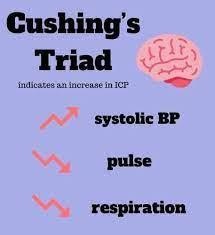A client is admitted to the hospital with a traumatic brain injury after his head violently struck a brick wall during a gang fight. Which finding is most important for the nurse to assess further?
A scalp laceration oozing blood.
Dizziness, nausea, and transient confusion.
Headache rated "8" on a 0-10 scale.
Serosanguineous nasal drainage.
The Correct Answer is D
Choice A rationale: This is a possible sign of TBI but is not necessarily indicative of a life- threatening condition.
Choice B rationale: This is a possible sign of TBI but is not necessarily indicative of a life- threatening condition.
Choice C rationale: This is a possible sign of TBI but is not necessarily indicative of a life- threatening condition.
Choice D rationale: Serosanguineous nasal drainage (a mixture of blood and clear fluid) may suggest a basilar skull fracture, which is a fracture of the base of the skull that can damage vital structures such as the brainstem, cranial nerves, or major blood vessels. This can lead to serious complications such as meningitis, cerebrospinal fluid leak, or hemorrhage.
Nursing Test Bank
Naxlex Comprehensive Predictor Exams
Related Questions
Correct Answer is B
Explanation
Choice A rationale: Bell's palsy is not caused by a bacterial infection; hence, antibiotics are not the primary treatment.
Choice B rationale: Corticosteroids like prednisone are often used to reduce inflammation and improve symptoms in Bell's palsy.
Choice C rationale: While vitamins can support overall health, they are not the primary treatment for Bell's palsy.
Choice D rationale: Surgery is not the primary treatment for Bell's palsy unless certain complications arise.
Correct Answer is C
Explanation
Choice A rationale: Irregular respirations, bradycardia, and widened pulse pressure might indicate increased intracranial pressure.
Choice B rationale: This set of symptoms is often seen in cardiac tamponade and is referred to as the Beck’s triad and not Cushing's triad.
Choice C rationale: Cushing's triad is a set of clinical signs associated with increased intracranial pressure (ICP) and typically includes bradycardia (slow heart rate),
hypertension (elevated blood pressure), and irregular breathing patterns. Fixed pupils can also be present in some cases, but it's important to note that this triad is not always consistently present and may vary from person to person.
Choice D rationale: This set of symptoms describes symptoms of shock, not specifically Cushing's triad.

Whether you are a student looking to ace your exams or a practicing nurse seeking to enhance your expertise , our nursing education contents will empower you with the confidence and competence to make a difference in the lives of patients and become a respected leader in the healthcare field.
Visit Naxlex, invest in your future and unlock endless possibilities with our unparalleled nursing education contents today
Report Wrong Answer on the Current Question
Do you disagree with the answer? If yes, what is your expected answer? Explain.
Kindly be descriptive with the issue you are facing.
